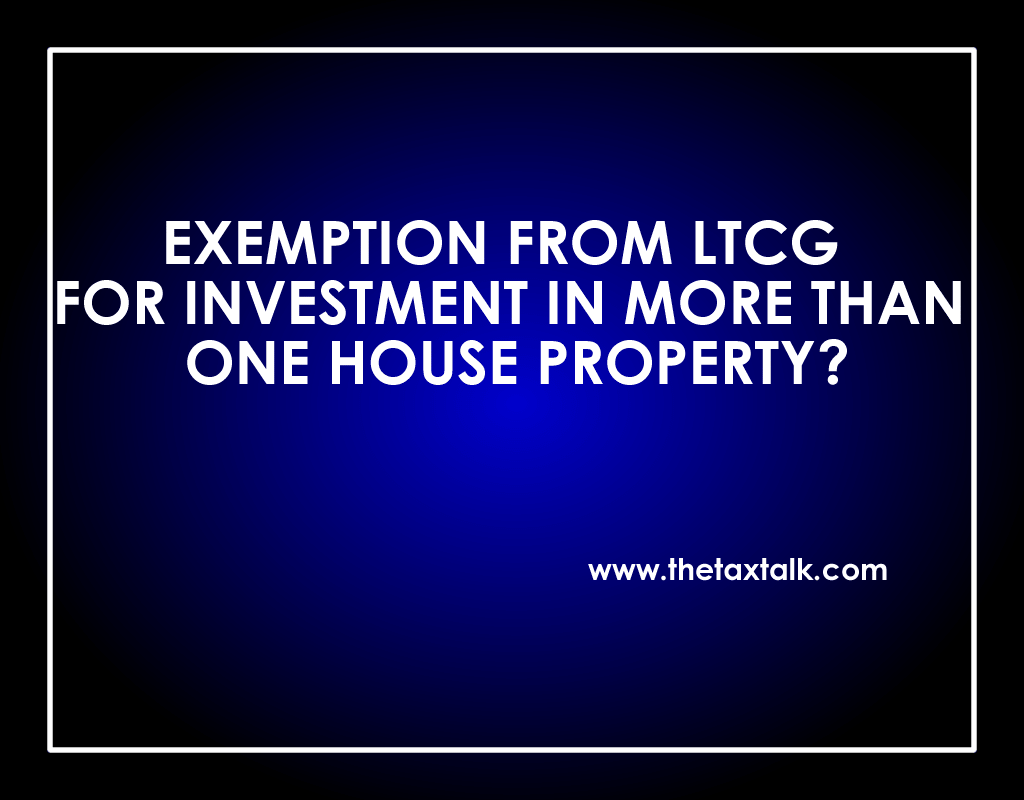![]()
EXEMPTION LTCG
Query 1]
I have inherited a residential flat bought by my father in 1970 and I am the sole owner. It is actually a Co-op housing society apartment, where the shares have been transferred in my name in 2006. I am thinking of selling the same.
I already own an apartment where I am presently living. My name is appearing jointly along with my son, though I did not contribute to its cost directly. I am a regular tax payer.
My queries are:-
- If I sell my inherited apartment, will I be eligible for Capital Gain tax even if I reinvest in residential property?
- If so, can I reinvest it in two or more small units with separate sale deeds, say even in separate cities? Hypothetically, can I reinvest in a small building with say 4 apartments?
- If I am not eligible for CG exemption because I own another flat (where I am staying) & have my name in my son’s house, should I come out of this property?
- If I do that, would it amount to a gift to my son? How my share would work out? Will I have to pay stamp duty, CG on the present minus indexed original values? I presume there would be no gift tax for my son.
- The flat I am staying, I can gift to my wife. What would be the tax implications for me and my wife too – stamp duty, gift tax & Capital Gain? If later the same is rented out, whose income would it be counted as – mine or my wife’s?
My main aim is to consolidate this property I have inherited & leave behind, in inheritance, clear titled properties (jointly with me) to each of my family members. I could as well just leave all this in my will, but this way the chances of any misunderstandings are minimized & the family would remain integrated after me.
[*****@rediffmail.com]
Opinion:
- The sale of inherited residential property would give rise to the taxable Long Term Capital Gain (LTCG) in your hands. The tax on long term capital gain arising on sale of a residential house property could be claimed as exempt u/s 54 if LTCG is invested for purchase of a residential house property.
- The availability of your name in the flat owned by your son in no way hampers or forbids your claim for exemption u/s 54 arising on sale of your inherited property. Exemption u/s 54 can be claimed even if the assessee on the date of investment owns more than one house property. There is no need for you to take out your name from the flat owned by your son. Also, there is no need to transfer the house property in the name of your wife.
- The important question is whether the exemption will be available if you invest the capital gain for purchase of more than one house property?
- As per provisions of the section 54 of the IT Act-1961, the long-term capital gain arising to an individual / HUF assessee, from the sale of a residential house property shall be exempt if the amount of Long Term Capital Gain (LTCG) is invested within a stipulated time for purchase of “a ” residential house. Whether exemption will be available on investment of capital gain for purchase of more than one house property is question with no final verdict. The issue is a vexed one and divergent views have been expressed by the Judiciary on the issue depending upon the facts & circumstance of each & every individual case. Confusion prevails as to the interpretation of alphabet “a” used in section 54.
-
The word “a” has been interpret either way in the judicial pronouncement:
a] The Mumbai bench of the IT Appellate Tribunal in the case of Gulshan banoo R. Mukhi vs Joint CIT ((2003) 78 TTJ 768 (Mumbai) held in favor of the department interpreting the term `a residential house’ as meaning one property. Recently, Punjab & Haryana High Court in the case of Pawan Arya Vs. CIT (2011) 37 CTR (P & H) 210 has held that exemption u/s 54 is available in respect of one house property only.
b] The Bangalore High Court in CIT Vs. D. Anand Basappa [2009] 180 Taxmann 4 (Kar) has affirmed the view of the Tribunal & has upheld that the exemption can be claimed in respect of the investment made in more than one house. Similar view are expressed in
i] ITO Vs. P.C. Ramakrishna (2007) 108 ITD 251 (Chennai),
ii] Prem Prakash Bhutani Vs. CIT (2007) 110 TTJ (Delhi) 440, &
iii] CIT Vs. Rukminiamma (2011) 196 Taxman 187 (Kar). - As of now, there is no Supreme Court Ruling on the issue. To be on a safer side, better interpret the word “a” as one house property only. If investment in one property is not possible, you can think of buying a plot and construct the house thereon in such a way that the property could be divide in different residential units at a later date.
- Gift to your wife: If you gift the existing flat to your wife, there will not be any gift tax liability, neither on you nor on your wife. The subsequent rental income would be clubb with your income for taxation purpose. The Gift transactions would attract the stamp duty as per the law of the State where the property is located.
EXEMPTION LTCG
[button color=”” size=”” type=”round” target=”” link=”https://thetaxtalk.com/”]home[/button] [button color=”” size=”” type=”round” target=”” link=”https://thetaxtalk.com/submit-article-publish-your-articles-here/”]Submit Article [/button] [button color=”” size=”” type=”round” target=”” link=”https://thetaxtalk.com/discussion-on-tax-problem/”]Discussion[/button]

